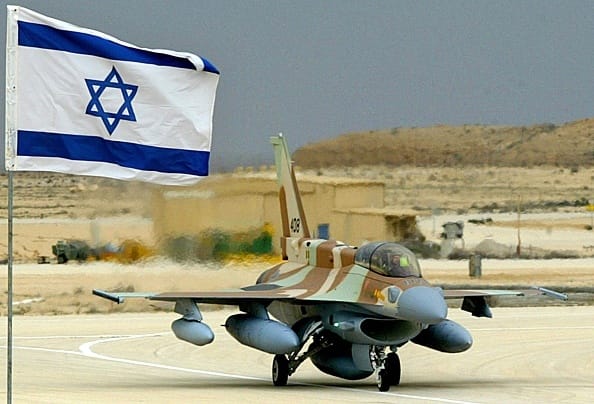12 April 2024
The explainer

The UK makes parts of F-16 fighter jets used by Israel in Gaza, according to campaigners. Yoav Lemmer/AFP/Getty
Should Britain stop selling arms to Israel?
The recent Israeli air strike on an aid convoy in Gaza, which killed seven people including three Britons, has intensified calls for the UK government to suspend arms exports to the Jewish state.
Who’s making the demand?
The Lib Dems, the SNP and the Greens, as well as Labour’s London mayor Sadiq Khan. Many eminent Tories have taken up the cry too, including the MP Alicia Kearns, chair of the Foreign Affairs Select Committee; the peers Nicholas Soames and Hugo Swire; and the former Foreign Office minister Alan Duncan, who has said his party is riddled with pro-Israel “extremists”. Last week, more than 600 legal experts, including three former Supreme Court justices, signed a letter warning that the government risked breaking international law by not stopping exports.
Will Downing Street follow their advice?
No. Foreign Secretary David Cameron is no Zionist headbanger: as PM, he described Gaza as a “prison camp”; as leader of the opposition, he condemned Israel’s 2006 invasion of Lebanon as “disproportionate”. But while he recently described UK support of Israel as “not unconditional”, he’s shot down the prospect of an arms embargo. This sets Britain apart from the likes of Canada, the Netherlands and Japan, who have all imposed arms bans on Israel since the Gaza war began.
Has Britain suspended exports to Israel before?
Many times. An arms embargo was established during the 1973 Yom Kippur War, with US planes delivering weapons to Israel even barred from using UK military bases. Mrs Thatcher suspended arms sales during the 1982 Lebanon War (the same year, incidentally, that Israel sold weapons to Argentina for use in the Falklands). This ban lasted until 1994 – Britain even refused to send Israel gas masks during the 1991 Gulf War, when Iraqi missiles hit Tel Aviv. There have been subsequent arms bans in 2002 and 2009, when Israeli military campaigns inflicted what was judged to be an unacceptable level of civilian suffering.
How big is the UK-Israeli arms trade today?
Tiny. Britain has sold arms worth less than £600m to Israel since 2008 – mainly parts for aircraft and radar systems. In 2022, the figure was £42m, about 0.02% of Israel’s overall weapons imports. The country’s biggest supplier by far is the US, which accounts for 69% of the total, followed by Germany on 30%. America’s support of Israel is a long-established geopolitical fact. For obvious historical reasons, the German establishment is also staunchly pro-Israel – in a leaked email, the CEO of the media giant Axel Springer described his own position as “Zionism uber alles”. Nicaragua has asked the UN’s International Court of Justice to halt these German exports to Israel, on the grounds they’re “facilitating genocide”.
What about the rest of Britain’s arms industry?
By global standards, it’s big but not top tier. The Stockholm International Peace Research Institute ranks the UK as the seventh-biggest arms exporter, with 3.7% of the market, behind America, France, Russia, China, Germany and Italy. In recent years, our top customers have included Saudi Arabia, the US, Qatar and Ukraine, with the Middle East as a whole accounting for 43% of our exports. This all added up to £12bn in 2022, of which 68% was aerospace-related – planes and their associated gadgets.
How picky are we about our customers?
Not very. Though there are export rules about not selling weapons to dodgy governments, these are routinely flouted. A 2021 analysis by one campaign group found that, of the 73 countries then the subject of some degree of sanction, 58 had been sold military-grade equipment. Radars were flogged to the Chinese navy and riot shields to the Argentine police. Perhaps the most controversial has been weapons sales to Saudi Arabia, worth £1.1bn in 2022 alone. Britain sold the Gulf kingdom the fighter jets and missiles used to conduct its war in Yemen, which created a humanitarian catastrophe.
What makes the sales to Israel any different?
Nothing, says Charles Moore in The Daily Telegraph. By breaking our arms trade with Israel, “we would be sending a signal to other clients that when they get into difficult situations, we are ready to drop them” – and the vacuum would be filled by other nations, from the Americans and French to “the cheery old North Koreans”. Besides, we get far more help from Israel in the form of intelligence than we give them with our puny arms exports. Banning the sale of weapons, says Boris Johnson in the Daily Mail, sends the message that “we do not think any self-respecting country should be arming the Israelis”. And if everyone, up to and including the Americans, follows our lead, the inevitable conclusion would be “the military defeat of Israel and the victory of Hamas”.
Would it really?
Of course not, says the former national security advisor Peter Ricketts in The New Statesman. Britain and the rest of the West have been abundantly clear about Israel’s “right to defend itself” since Hamas’s heinous October 7 attack. But it’s also been made abundantly clear, through Israel’s brutal campaign in Gaza, that “military force alone” cannot solve this crisis. A British arms embargo, though purely symbolic, might help push the international community “to bring the fighting to an end”.
Elsewhere in The Knowledge Premium:
